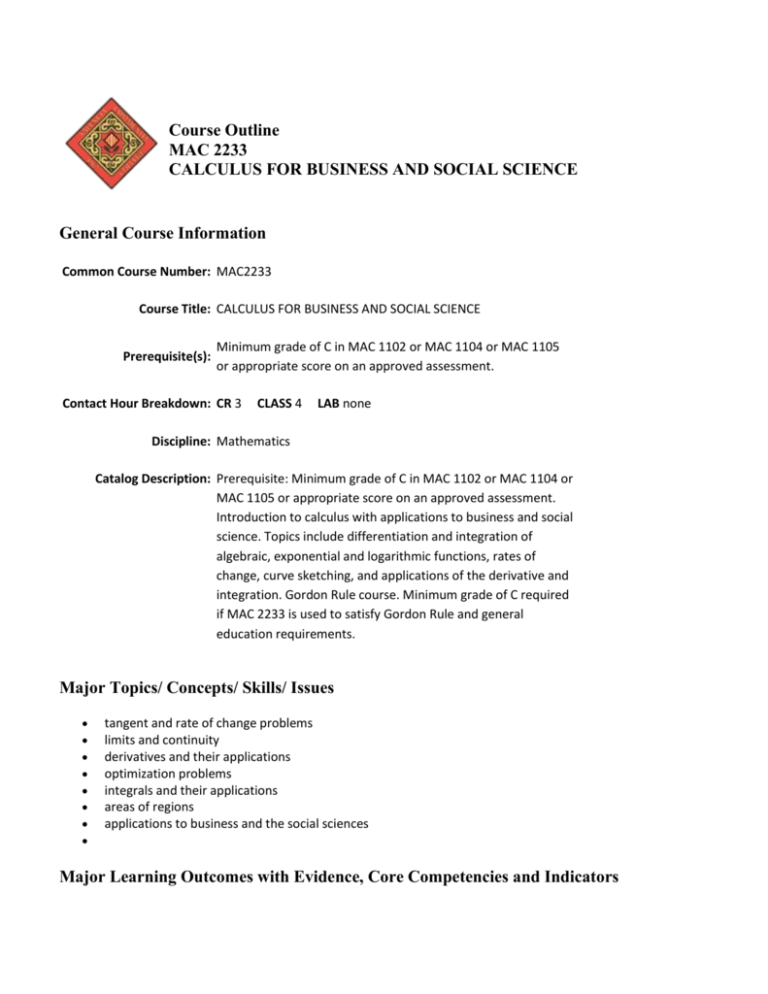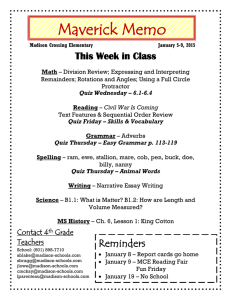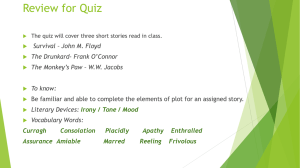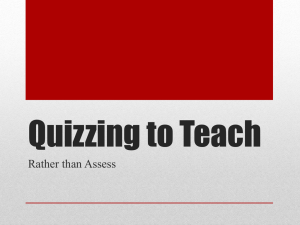Course Outline MAC 2233 CALCULUS FOR
advertisement

Course Outline MAC 2233 CALCULUS FOR BUSINESS AND SOCIAL SCIENCE General Course Information Common Course Number: MAC2233 Course Title: CALCULUS FOR BUSINESS AND SOCIAL SCIENCE Prerequisite(s): Minimum grade of C in MAC 1102 or MAC 1104 or MAC 1105 or appropriate score on an approved assessment. Contact Hour Breakdown: CR 3 CLASS 4 LAB none Discipline: Mathematics Catalog Description: Prerequisite: Minimum grade of C in MAC 1102 or MAC 1104 or MAC 1105 or appropriate score on an approved assessment. Introduction to calculus with applications to business and social science. Topics include differentiation and integration of algebraic, exponential and logarithmic functions, rates of change, curve sketching, and applications of the derivative and integration. Gordon Rule course. Minimum grade of C required if MAC 2233 is used to satisfy Gordon Rule and general education requirements. Major Topics/ Concepts/ Skills/ Issues tangent and rate of change problems limits and continuity derivatives and their applications optimization problems integrals and their applications areas of regions applications to business and the social sciences Major Learning Outcomes with Evidence, Core Competencies and Indicators Demonstrate an understanding of the limiting process as it applies to functions, continuity, derivatives and integrals. Corresponding Evidence of Learning Student will be able to Find limits graphically, numerically, and algebraically. Student will be able to Given a function, determine its continuity and the relationship to limits and the graph of the function. Student will be able to Given a function, apply the algebra of limits to find exact values of the derivative of the function. Core Competency: Think Indicators Assessments analyze data, ideas, patterns, principles, perspectives Classroom assessment technique employ the facts, formulas, procedures of the discipline integrate ideas and values from different disciplines draw well-supported conclusions revise conclusions consistent with new observations, interpretations, or reasons Group presentation Knowledge recall quiz Locally developed exam/objective Locally developed multiple choice exam Problem-solving quiz Project Core Competency: Communicate Indicators employ methods of communication appropriate to your audience and purpose Assessments Classroom assessment technique Group presentation Knowledge recall quiz Locally developed exam/objective Locally developed multiple choice exam Problem-solving quiz Project Core Competency: Act Indicators apply disciplinary knowledge, skills, and values to educational and career goals implement effective problem-solving, decisionmaking, and goal-setting strategies Assessments Classroom assessment technique Group presentation Knowledge recall quiz Locally developed exam/objective Locally developed multiple choice exam Problem-solving quiz Project Demonstrate an understanding of the concept of derivative. Corresponding Evidence of Learning Student will be able to Approximate the derivative at a point numerically and graphically. Student will be able to Recognize the relationship between rate of change and derivative in the context of an application. Student will be able to Recognize the relationship between slope of tangent line and derivative. Student will be able to Recognize the correlation between the physical and geometric interpretations of derivative. Student will be able to Apply the rules of differention to compute the derivative of a function. Student will be able to Demonstrate use of first and second derivatives in analyzing the graph of a function. Core Competency: Think Indicators Assessments analyze data, ideas, patterns, principles, perspectives Classroom assessment technique employ the facts, formulas, procedures of the discipline integrate ideas and values from different disciplines draw well-supported conclusions revise conclusions consistent with new observations, interpretations, or reasons Group presentation Knowledge recall quiz Locally developed exam/objective Locally developed multiple choice exam Problem-solving quiz Project Core Competency: Value Indicators Assessments recognize mathematical values and employ them as a Classroom assessment technique standard of judgement Group presentation Knowledge recall quiz Locally developed exam/objective Locally developed multiple choice exam Problem-solving quiz Project Core Competency: Communicate Indicators employ methods of communication appropriate to your audience and purpose Assessments Classroom assessment technique Group presentation Knowledge recall quiz Locally developed exam/objective Locally developed multiple choice exam Problem-solving quiz Project Core Competency: Act Indicators apply disciplinary knowledge, skills, and values to educational and career goals implement effective problem-solving, decisionmaking, and goal-setting strategies Assessments Classroom assessment technique Group presentation Knowledge recall quiz Locally developed exam/objective Locally developed multiple choice exam Problem-solving quiz Project Calculate indefinite and definite integrals. Corresponding Evidence of Learning Student will be able to Given an indefinite integral choose appropriate methods to evaluate. Student will be able to Apply the Fundamental Theorem of Calculus to evaluate definite integrals. Student will be able to Use definite integrals to calculate areas of regions. Core Competency: Think Indicators Assessments analyze data, ideas, patterns, principles, perspectives Classroom assessment technique employ the facts, formulas, procedures of the discipline integrate ideas and values from different disciplines draw well-supported conclusions Group presentation Knowledge recall quiz Locally developed exam/objective revise conclusions consistent with new observations, interpretations, or reasons Locally developed multiple choice exam Problem-solving quiz Project Core Competency: Communicate Indicators employ methods of communication appropriate to your audience and purpose Assessments Classroom assessment technique Group presentation Knowledge recall quiz Locally developed exam/objective Locally developed multiple choice exam Problem-solving quiz Project Core Competency: Act Indicators apply disciplinary knowledge, skills, and values to educational and career goals implement effective problem-solving, decisionmaking, and goal-setting strategies Assessments Classroom assessment technique Group presentation Knowledge recall quiz Locally developed exam/objective Locally developed multiple choice exam Problem-solving quiz Project Solve applied problems using derivatives and integrals. Corresponding Evidence of Learning Student will be able to Be able to apply integrals in solving applied problems such as net change and accumulation. Student will be able to Be able to apply derivatives in solving applied problems such as optimizations and rates of change. Core Competency: Think Indicators Assessments analyze data, ideas, patterns, principles, perspectives Classroom assessment technique employ the facts, formulas, procedures of the discipline integrate ideas and values from different disciplines draw well-supported conclusions revise conclusions consistent with new observations, interpretations, or reasons Group presentation Knowledge recall quiz Locally developed exam/objective Locally developed multiple choice exam Problem-solving quiz Project Core Competency: Value Indicators Assessments recognize mathematical values and employ them as a Classroom assessment technique standard of judgement Group presentation Knowledge recall quiz Locally developed exam/objective Locally developed multiple choice exam Problem-solving quiz Project Core Competency: Communicate Indicators employ methods of communication appropriate to your audience and purpose Assessments Classroom assessment technique Group presentation Knowledge recall quiz Locally developed exam/objective Locally developed multiple choice exam Problem-solving quiz Project Core Competency: Act Indicators apply disciplinary knowledge, skills, and values to educational and career goals implement effective problem-solving, decisionmaking, and goal-setting strategies Assessments Classroom assessment technique Group presentation Knowledge recall quiz Locally developed exam/objective Locally developed multiple choice exam Problem-solving quiz Project College Curriculum Committee Website Office of the Vice President for Academic Affairs & Chief Learning Officer Valencia College Orlando, Florida Copyright © 2005 - 2013 Valencia College







